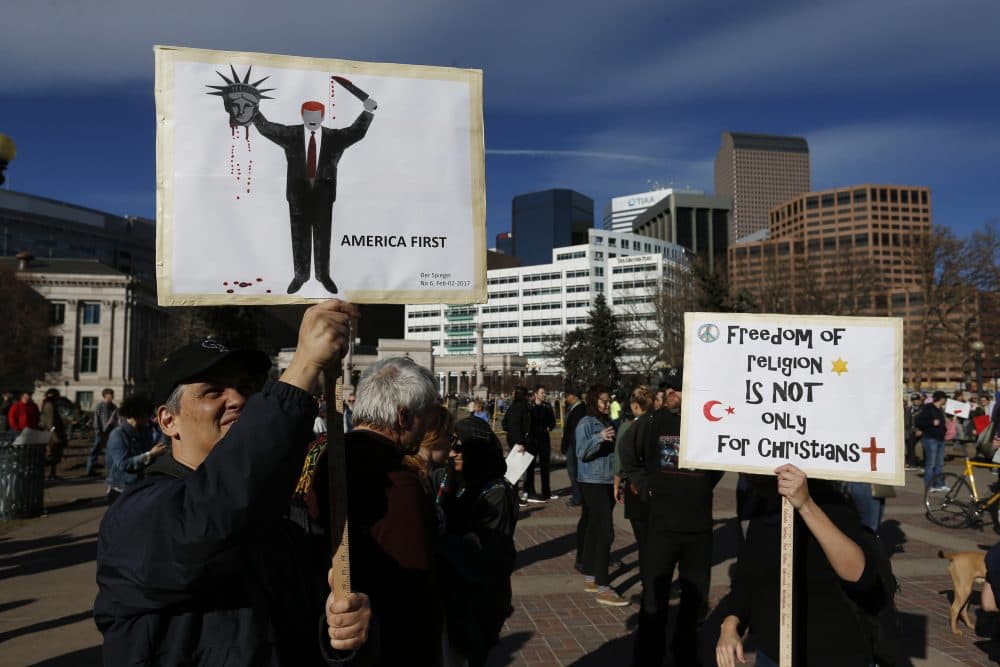Advertisement
America The Distrusted: International Media See Trump As Threat

COMMENTARY
America’s new image in the world is being reflected back to us, and it is ugly. Influential publications are calling for their nation's leaders to take a stand against this country, which they have portrayed as an existential threat to international order.
Der Spiegel, a German newsweekly, called President Donald Trump a "pathological liar" and a "racist." “He is attempting a coup from the top; he wants to establish an illiberal democracy, or worse; he wants to undermine the balance of power,” wrote editor-in-chief Klaus Brinkbäumer in a piece subtitled, "Trump as Nero." The magazine’s cover featured a cartoon of Trump beheading the Statue of Liberty with a machete.
The Economist, a conservative British newsweekly, characterized Pres. Trump as "reckless and chaotic," incessantly lobbing a “Molotov cocktail of policies and executive orders against the capital’s brilliant-white porticos.”
In an editorial, The Japan Times worried about Trump’s repeated citing of “alternative facts" that are not true. “The president of the U.S. is the most powerful man in the world, whose decisions can impact the lives of countless millions, if not billions, of people. The idea that he is not wedded to reality as experienced by everyone outside his bubble is terrifying.”
The Irish Times recommended that Ireland's leaders “convey to Donald Trump the conviction of our people that he has broken with some of the noblest traditions and values of his country and ours, and our determination that we will not be party internationally to his narrow 'America First' unilateralist project.”
Even The Malta Independent minced no words: “Trump is all for undermining the EU, destroying the euro, helping other countries to split away from the EU.”
Heads are spinning from Trump’s repeated praise of Brexit, the U.K.’s vote to end participation in the European Union, which he has portrayed as a bureaucratic nightmare. During his joint press conference with Prime Minister Theresa May, he explained that he tried to do a deal with an unnamed European country and found approval for the deal harder to get from the EU than from the country itself.
Advertisement
Trump seems to be actively undermining the stability of the European Union, a political and trading organization with 27 members, by suggesting Ted Malloch become its U.S. ambassador. Malloch, a business management professor at the University of Reading, in England, has predicted that the EU’s common currency would not survive another 18 months and has expressed a desire to “short the euro,” betting that its value will decline.
Der Spiegel’s editor fears Trump as a “brute and choleric man” who wants “to force the rest of the world into humiliating concessions.”
Malloch has not yet been nominated as ambassador and would have to be approved by the Senate, but he’s already being rejected abroad. The Financial Times investigated Malloch’s background and was unable to substantiate claims he made in his book that a film he produced had been nominated for an Emmy and that he had been made a laird by Lord Lyon of Scotland.
With populism rising in France, the EU is jittery about the possibility of more countries leaving. But the community, whose population is greater than that of the U.S., will not be dissolving in the near future. Shifting away from the euro and back to national currencies would take years of work and careful, expensive unwinding. Britain does not have to change its currency because it never adopted the euro.
After Trump announced that he would put America’s interests first and rejected the Trans-Pacific Partnership, countries have worried that he will not uphold treaties, conventions or trade pacts.
Der Spiegel’s editor fears Trump as a “brute and choleric man” who wants “to force the rest of the world into humiliating concessions.” To defend itself economically, Der Spiegel urged Germany to ally with European, Asian and African partners. The European Union sent a letter to member nations telling them to hurry up and conclude their trade deals. German Chancellor Angela Merkel said if trade discussions slow with the U.S., the EU would do other trade deals faster. “We are negotiating with Japan, with India, with Australia and we are negotiating with Mercosur," a Latin American trade group that includes Paraguay, Argentina, Brazil and Uruguay, she said.
Most of the publications have advised their leaders to stand up and oppose Trump and his government while preserving multilateral institutions such as the United Nations, the World Trade Organization, the Intergovernmental Panel on Climate Change, NATO and the EU that help organize and govern a complex world — institutions that Trump’s chief advisor Steve Bannon has characterized as globalist elites whose policies and practices benefit the wealthy at the expense of commoners.
Despite the urgent and angry tenor of these editorials, not one encouraged their governments to pull up the drawbridge and disengage from the United States, which is still, by some measures, the world’s biggest economy. Instead, leaders are lining up to sell him on the profitability of their traditional alliances. They hope he buys it.
